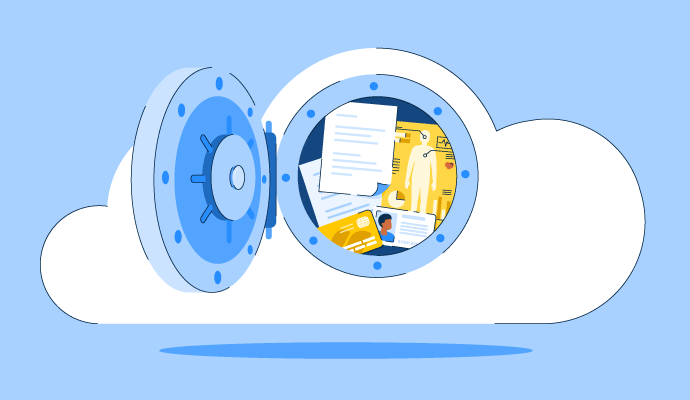When a business decides to move its data into the cloud, there is always the underlying question of security.
Especially since it feels like we can’t go more than a few weeks without a major company being hit by a data breach. Cyber security and ensuring that all of your data is protected from hackers is an absolute must, and it might be in your company’s best interest to move things to the cloud to keep this data safe.
But before that, let’s explore the inner workings of cloud data security software, the types you can choose from, plus the benefits and risks of cloud security before you make the great migration into the sky.
What is cloud security?
Cloud security is the strategies and policies used to protect data applications, services, infrastructure, and cloud system apps.
When cloud security is done right, it’s an essential component of a cloud environment that can work for both businesses and customers alike. When it’s not, well, that’s a different story.
Let’s break down everything you need to know about cloud security because, let’s be real, no one likes a data breach.
Types of cloud
No, I’m not talking about the Stratus, Cumulus, Cirrus, and Cumulonimbus clouds you learned about in school. I’m talking about public, private, and hybrid clouds used for security. Do you know the difference?
Public clouds
A public cloud is a service where third-party cloud service providers make virtual machines, applications, and storage available to the public over the internet. Users can access these services remotely as long as they have an internet connection, as the provider typically hosts and maintains them.
The public cloud is often offered on a pay-per-use or subscription basis, allowing users to manage the physical infrastructure without investing heavy amounts at once. A public cloud is created from hardware owned and managed by a third-party company whose resources are shared with multiple clients.
Examples of public clouds are Amazon Elastic Compute Cloud (EC2), IBM’s Blue Cloud, Google App Engine, and Windows Azure Services Platform.
Private clouds
A private cloud is a service dedicated to an individual or a single organization. A third-party provider manages the infrastructure and resources on behalf of the organization. Unlike a public cloud, the infrastructure is not shared among multiple users, thus providing a private cloud owner more control and customization.
It's often the preferred option for organizations that require great control over their data and applications or have strict security requirements. The resources within a private cloud are sourced from systems dedicated to and managed by those using them.
Instead of being defined by location or ownership, they are defined by privacy settings and management responsibilities.
Examples of private cloud providers include Dell, IBM, Oracle, and Hewlett-Packard Enterprise.
Tip: Interested in going with a private cloud, but unsure which one makes the most sense for you? Check out this complete list of the best virtual private cloud software on the market.
Hybrid clouds
Ready for the best of both worlds? A hybrid cloud is a combination of one or more public or private cloud environments. They are developed partially from hardware owned and managed by a third party, in addition to hardware owned by the owner.
It allows an organization to use public and private clouds while eliminating limitations. It allows organizations to keep sensitive information on private clouds while taking advantage of a public cloud's scalability, cost-effectiveness, and flexibility. It is a flexible method for organizations to manage their infrastructure and IT.
Examples include Azure and VMWare Cloud on AWS.
Want to learn more about Cloud Data Security Software? Explore Cloud Data Security products.
Cloud security benefits
The great thing about cloud security is the multiple levels of control it provides to protect cloud-based assets, like websites and web applications. These security measures also work to protect data and the privacy of a business’s customers.
Whether you use a public, private, or hybrid cloud, there are many benefits to using a cloud to secure your data. Let’s break them down.
DDoS protection
Distributed denial of service (DDoS) attacks are on the rise, especially if your business falls in the retail or gaming industries. A DDoS attack is done by sending large amounts of traffic to a targeted website or web application using vulnerable systems with the hopes of overwhelming the server so that it is unable to respond to a request by a legitimate user. Basically, your website is flooded with requests until it crashes.
When this sort of attack is successful, your website or application can be down for hours, or even days. Not only can this cause a loss of revenue, but it can also cost you your customer's trust in your brand and its products.
An advanced cloud security network will monitor and identify these attacks before they occur. Some examples of DDoS attacks are buffer overflow, Hypertext Transfer Protocol (HTTP) flood, and Network Time Protocol (NTP) amplification.
Tip: Interested in learning more about the cloud DDoS mitigation software? Check out this roundup so you can protect yourself from DDoS attacks.
Data security
The last thing you want to happen to your organization is a data breach. To avoid this, you may invest in malware protection, anti-virus software, and intrusion protection.
In addition, cloud security networks feature their own protocols to protect communication between the company servers and users of that server, which also covers the protection of sensitive information and transactions that go hand-in-hand with an e-commerce website.
Reduced cost
When you utilize a cloud security network and cloud storage, you eliminate the need to invest in dedicated hardware to do it for you. Not only will this reduce capital spending, but also free up time for your IT department to focus on other issues, instead of chasing down security threats.
Reliability
When your business implements the right cloud security measures, users can feel safe and confident when they access data and applications, no matter the device they use.
 Source: KnowYourMeme.com
Source: KnowYourMeme.com
Security challenges in the cloud
Just because there are benefits to using cloud security doesn’t mean there aren’t some risks you could encounter along the way. Recognizing the risks is the first step to securing data on the cloud.
Loss of data
This may seem obvious, but even the most robust and secure cloud security systems can get hacked. With all of the sensitive data that companies store in the cloud, any sort of data breach can be detrimental.
Take Facebook, for example. In March 2019, they announced they hadn’t properly secured the passwords of as many as 600 million of its users, making these passwords easy for hackers to find and exploit. Worst still, this data was stored in plaintext and could be accessed by over 20,000 Facebook employees.
Contract breaches
Depending on your company, you may run into the issue of contracts with other business parties that restrict how data is used and who has the authority to access it.
If an employee were to move restricted data into the cloud without authorization, the contract could be violated, resulting in legal action taking place.
Loss of customer trust
If a company you used regularly was a victim of a data breach, and your information was compromised, would you continue to trust them with your business?
My guess is no. Loss of trust is an inevitable result of a data breach. For instance, after Panera’s data breach in April 2018, where 37 million customer accounts were affected by the exposure of their names, email addresses, birthdays, and credit card numbers, their customers decided to venture elsewhere for lunch.
Loss in revenue
Along with a loss of trust comes a loss of revenue. In December 2013, Target was the victim of a data breach that affected the credit and debit card information of up to 110 million. Since this was right around the holiday season, a time when stores like Target usually see an increase in revenue, the company actually experienced a 46% drop in quarterly profit. They also estimated the breach cost them $148 million.
Cloud security software
Get your head out of the clouds
It’s time you made the most of what cloud security can do for your company. As long as you go about it the right way, use a reliable cloud network, and learn from the mistakes of others, you’ll float through the air and above the competition.
Now that you’re well-versed in cloud security, expand your vocabulary even further with 70+ cyber security terms.

Mara Calvello
Mara Calvello is a Content and Communications Manager at G2. She received her Bachelor of Arts degree from Elmhurst College (now Elmhurst University). Mara writes content highlighting G2 newsroom events and customer marketing case studies, while also focusing on social media and communications for G2. She previously wrote content to support our G2 Tea newsletter, as well as categories on artificial intelligence, natural language understanding (NLU), AI code generation, synthetic data, and more. In her spare time, she's out exploring with her rescue dog Zeke or enjoying a good book.
